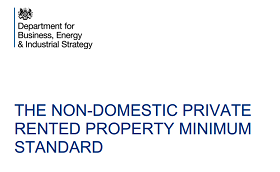Non-domestic Private Rented Property minimum standard
[edit] Introduction
In February 2017, the government published guidance for landlords of privately rented non-domestic property to help them comply with the 2018 ‘minimum level of energy efficiency’ standard (EPC band E).
From April 2018, the Energy Efficiency (Private Rented Property)(England and Wales) Regulations 2015 will require that private non-domestic (and domestic) landlords ensure properties rented in England and Wales reach at least an EPC rating of E before granting a tenancy to new or existing tenants. These requirements will apply to all private rented non-domestic properties, including properties where there has been no change in the tenancy arrangements, from April 2023.
The new guidance is aimed at non-domestic landlords, local weights and measures enforcement authorities, and others such as letting agents and property management agencies.
The document provides guidance and advice on the following:
- Scope of the regulations: The steps a landlord should take to determine whether their property is covered by the regulations, and the steps they should take to ensure their property complies with the minimum level of energy efficiency.
- Relevant improvements:How a landlord can identify appropriate energy efficiency improvements for their property.
- Cost effectiveness: How a landlord can calculate whether possible improvements would be cost effective.
- Exemptions and exclusions: The exemptions framework and the steps a landlord should take to register a valid exemption.
- Enforcement: The enforcement framework and the options available to enforcement authorities when policing compliance, including information on fines and other penalty options.
- The appeals framework: Landlord appeals will be heard by the First-tier Tribunal, the guidance discusses the steps a landlord will need to take to lodge an appeal, and how that process will be run.
Where a landlord believes that an F or G EPC-rated property they rent qualifies for an exemption from the minimum energy efficiency standard, an exemption must be registered on the PRS Exemptions Register. The government will provide further guidance on this later in the year.
Separate guidance to domestic private landlords on complying with their obligations under the minimum standard regulations will be published later in the year.
John Alker, Campaign & Policy Director, UK Green Building Council, said: “We warmly welcome the publication today of guidance for minimum energy efficiency standards. The regulations have already had a galvanising effect on the commercial property industry, which has been working hard for the last few years to prepare for these regulations. We now need to see the same clarity from Government in relation to privately rented homes, to ensure that this crucial piece of legislation lives up to its potential - reducing energy bills for households and businesses alike.”
You can download the guidance document here.
[edit] Related articles on Designing Buildings Wiki
Featured articles and news
Restoration and renewal of the Palace of Westminster
A complex project of cultural significance from full decant to EMI, opportunities and a potential a way forward.
Apprenticeships and the responsibility we share
Perspectives from the CIOB President as National Apprentice Week comes to a close.
The first line of defence against rain, wind and snow.
Building Safety recap January, 2026
What we missed at the end of last year, and at the start of this...
National Apprenticeship Week 2026, 9-15 Feb
Shining a light on the positive impacts for businesses, their apprentices and the wider economy alike.
Applications and benefits of acoustic flooring
From commercial to retail.
From solid to sprung and ribbed to raised.
Strengthening industry collaboration in Hong Kong
Hong Kong Institute of Construction and The Chartered Institute of Building sign Memorandum of Understanding.
A detailed description from the experts at Cornish Lime.
IHBC planning for growth with corporate plan development
Grow with the Institute by volunteering and CP25 consultation.
Connecting ambition and action for designers and specifiers.
Electrical skills gap deepens as apprenticeship starts fall despite surging demand says ECA.
Built environment bodies deepen joint action on EDI
B.E.Inclusive initiative agree next phase of joint equity, diversity and inclusion (EDI) action plan.
Recognising culture as key to sustainable economic growth
Creative UK Provocation paper: Culture as Growth Infrastructure.
Futurebuild and UK Construction Week London Unite
Creating the UK’s Built Environment Super Event and over 25 other key partnerships.
Welsh and Scottish 2026 elections
Manifestos for the built environment for upcoming same May day elections.
Advancing BIM education with a competency framework
“We don’t need people who can just draw in 3D. We need people who can think in data.”























